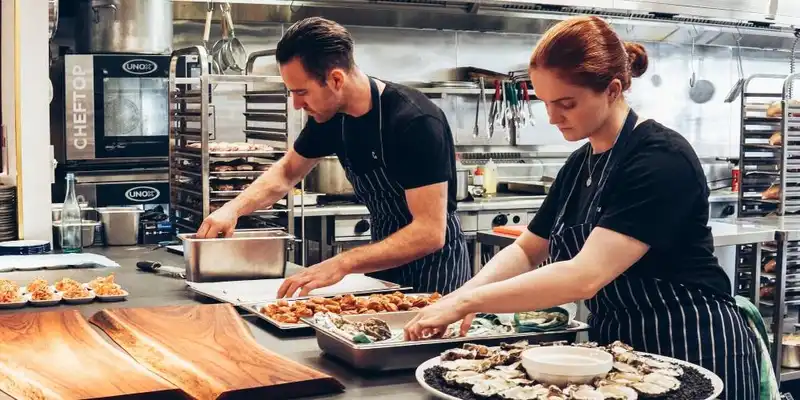5 Ways to Delegate Effectively and How a To Do App Can Help
As a manager in the foodservice industry, it's your job to delegate tasks to your employees from the top down. And you need to delegate well if you want your restaurant operations to run like a well-oiled machine.
But how do you become an effective delegator? First off, you need to understand that delegation goes beyond simply telling your employees what to do. Rather, think of it as a legitimate leadership strategy that encompasses many areas of restaurant operations.
This is one area where a to-do app or a task management app can come in handy.
But before we dive into how this tool can help you delegate better, let's get something out of the way.

The meaning of the term might sound obvious to some, but you'd be surprised at how many peopleincluding leaders like yourselfare getting it wrong.
The reason is that they're confusing delegation with abdication.
Delegation is when you're assigning authority, along with the duties and responsibilities that come with it, to someone else. Abdication, on the other hand, is when you're assigning a task to another person and then forgetting about it.
Big difference right there.
But here's the most important distinction, great leaders don't abdicate; they delegate.
Do you want your employees to perform their tasks well, engage in behaviors that align with your restaurant's operational goals, and help the company turn a hefty profit?
You better start delegating.
Delegating is not easy, especially if you're working in the restaurant sector. The food & beverage industry is fast-paced, unpredictable, and demanding, and you need every tool and resource you can get to get through heavy workloads, tight deadlines, and pressurized work environments.
So, what's a restaurant manager to-do? You can use a to-do app, for starters.
As mentioned earlier, using a to-do app can do wonders for your delegation efforts. But that's not everything the app can do.
In a nutshell, this type of software can provide restaurant managers with the following benefits
- Streamlines and optimizes task management
- Holds employees accountable
- Provides insightful and actionable reports
- Allows customization of tasks
- Monitors tasks in real-time
- Ensures that standard operating procedures are being followed
Here are 5 ways to delegate effectively as a manager in the foodservice industry and how automated task management software can help.

Do you want your employees to perform their tasks to the best of their ability and help your restaurant achieve its true potential?
Learn to let go.
When you're in a position of authority, the temptation to micromanage can be all too strong. That way lays potential to disaster.
Management is like holding sand. Grip the sand too tightly and it will slip through your fingers. But held loosely, the sand remains where it is.
There's nothing wrong with being a hands-on leader, but if you do it to an extent where your employees feel you're intruding on their work, don't be surprised if they're not as efficient and productive as you expect them to be. And don't be surprised if they slip through your fingers.
Try to put yourself in their shoes. If you're the bartender and your boss keeps taking over the bar to show you how to prepare a drink or how to manage the bar inventory, would you feel useful to the company? Would you feel engaged in your work?
Exactly.
Do you want to bring out the best in your employees? Learn to get out of the way and only intervene when absolutely necessary.
Task management software makes it easier for you to let go because it helps you hold your team members accountable for their actions in the workplace.
Some brands even offer applications that can be used on a regular basis to help better track your tasks, like a Daily Checklist Report.
With this, you can see and monitor the status of all tasks assigned to your employees. It's also a good way to ensure that your teams are being productive and not just padding their work hours.
Because Checklist programs allow you to adopt a more hands-off approach with minimal risk, your team is given enough room to figure things out for themselves. The old saying the best way to learn is by doing applies here.
When you're not always looking over their shoulders, your members will be more able to take ownership of their responsibilities, and in so doing, excel in their work.
Moreover, by learning to let go, not only are you better able to harness the strengths of your team, but you're also giving yourself more time to focus on your core responsibilities as a manager.
Clear communication is critical to effective delegation, especially in the foodservice business.
More to the point, if you want your employees to understand their tasks and implement them to the T, tell them what they need to do in a clear, specific, and thorough manner.
After all, how else can you cut through the noise in a fast-paced and chaotic working environment typical of restaurant operations?
Being vague doesn't help anyone. Don't just tell the new hire to clean the dining area. To ensure that his work meets your company's cleanliness standards, provide him/her with all the information that may impact the job's outcome, as well as how to carry out tasks in the right order.
If you fail to do any of the above, your new hire might end up doing things differently, and you only have yourself to blame if mistakes are made.
It can be difficult for your members to commit everything to memory, so here's a Pro Tip. Create a restaurant operations manual or an SOP (standard operations manual). An SOP is a document your restaurant staff can use as a guide to ensure that your restaurant business is running seamlessly and meeting operational standards.
The only problem with SOPs? It can be long, boring, and a pain to read.
Thankfully, you can make a lightweight version by incorporating the most important parts of your operations manual in a to-do app.
The software has robust customization featurestask images, types, explanations, and morethat can help you tailor your task checklists according to the specific needs of your restaurant business.
And because your tasks are so clearly laid out in the app, your employees will find it easier to understand their tasks, roles, and responsibilities.
This keeps them engaged and laser-focused in their work, which will help them meet the restaurant's operational standards as well as achieve your restaurant's desired outcomes in less time.

When you're delegating, you're not only managing people, you're also managing the company's time and resources.
Want to maximize all three? Then you better learn how to manage your priorities.
According to a 2017 Gallup research, employees from all over the world spend more than 40% of their time on unimportant activities. Yes, you read that right40%! That's nearly half of their working hours gone to waste.
Imagine what your restaurant can accomplish if you lower that figure down to 20%? Or 10%? The impact on your bottom line will be tremendous.
So, how do you manage your priorities the right way? First, you need to accept that there are only so many hours in a day. As author and business strategist Greg McKeown wrote in his book Essentialism, You can do anything, just not everything.
In other words, make sure that your teams are not wasting their time on things or tasks that don't matter to your business. Rather, they need to focus on things that can help your business move forward.
That said, managing a restaurant business could get busy, making it more difficult to gauge or identify which tasks are important and which ones are not.
Task management software can give you insightful reports that let you monitor tasks in real-time and identify trends and issues as they arise.
This makes it easier to determine which tasks must be given priority and which ones can be addressed later. You're getting the lay of the land, so to speak, allowing you to create and implement task checklists according to level of importance with the least amount of effort.

Bill Gates once said, We all need people who will give us feedback. That's how we improve.
The Microsoft co-founder couldn't be more right. But that's not the only thing that feedback can do.
In a survey that dived into the feedback practices of 22,000 global leaders, it was found that managers who gave consistent feedback had employees who were three times more engaged. Meanwhile, those who scored in the bottom 10 percent had employees who were three times more likely to leave.
No surprise there. After all, feedback is meant to correct errors, discourage bad habits, boost morale, and clarify job expectations. More to the point, feedback not only improves job performance, but it also promotes your employees' personal and professional growth.
With that said, not all feedback is created equal.
For the feedback to stick, they must be provided consistently on a yearly basis at most, but more frequently is ideal. Waiting for a year to provide feedback only allows bad habits to accumulate over time, not to mention that it will prove stressful for everyone involved.
The only good feedback is that which is provided constructively. In fact, according to a 2015 study conducted by well-being expert Michelle McQuaid, employees are more likely to be engaged at work when managers focus on their strengths.
Most importantly, make sure that every feedback is followed up on. Feedback processes are already a commonplace that some organizations don't derive much value from. What is the use of giving feedback if the system in place keeps allowing a staff member to cut corners?
For feedback to have meaning and impact, make sure that it leads to action. Make sure that there's a feedback loop in place and that employees are reminded consistently to curb the undesirable behavior.
Of course, you can't create a feedback-friendly culture without a system that helps you monitor the overall performance of your employees and identify issues as they arise.
Task management apps are detailed reports and can help you gain valuable insights about your employees' performance, which can in turn, help you deliver feedback that's effective, actionable, and appropriate to the situation.
When delegating, don't just tell your employees what to do and then leave them out in the wild. You need to provide sufficient training for them to excel in their tasks, serve customers better, and help your restaurant grow.
Besides, employeesat least the really good onescrave training.
According to a Deloitte University Press survey, 85% of respondents cited learning as important or very important -- up 21% from last year.
This is even truer in the F&B sector, where's there's a strong connection between employee training and overall workplace happiness.
Happy workers are productive workers. It's science.
And mind you, we're talking about on-going training, not just onboarding training, meaning that even seasoned employees, as well as new employees, should continue to be trained on a regular basis.
For regular training to pay dividends in the long run, you need to set up a Staff Orientation and Training Program that will provide employees with standardized training, from orientation and improving skills to employee evaluations to team-building exercises.
A to-do app also helps in this regard by keeping track of all tasks involved in your restaurant operations in real-time, allowing you to identify training opportunities as they arise - not to mention help you zero in on task issues that can be detrimental to an employee's development.
Final Word
As a manager, you want your employees to become the best version of themselves, but in ways that will contribute to the growth of your restaurant business.
By investing in a to-do app, your delegation skills can become your superpower. In turn, your employees become happier and more engaged; this will also help them maintain peak performance and efficiency.














































